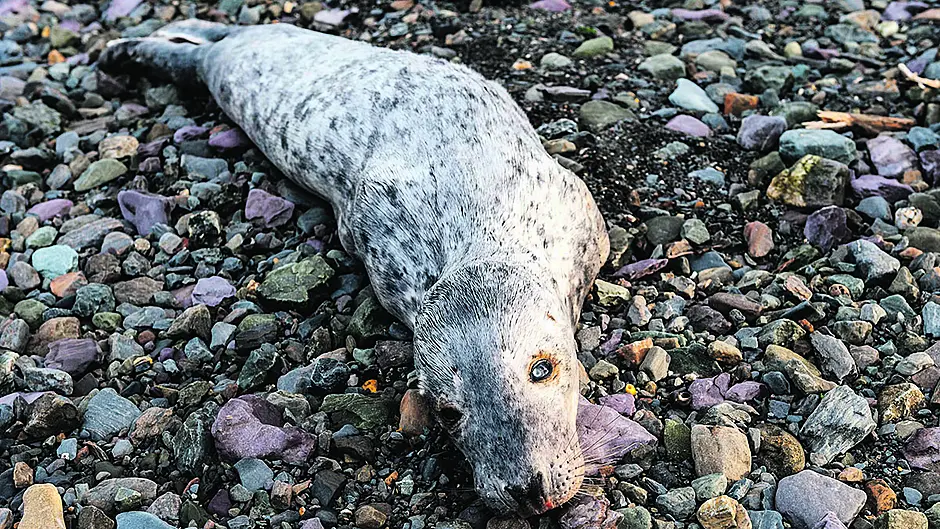Fishing interests and tourism bodies are likely to come into conflict in the coming months with increased calls for seals to be killed, amid claims they are threatening scarce fish stocks and damaging equipment
A SEAL expert has claimed that seals are being found shot dead, along the Irish coastline.
Brendan Price of the Irish Seal Sanctuary says that a number of people have contacted him, claiming to have found seals with gunshot wounds in the head.
One of those who contacted Mr Price was Michael Thompson from Sheep’s Head in West Cork, who says he has documented the death of several seals, which he has found while walking along the West Cork coastline near his home .
‘I live on Sheep’s Head and for about two years I have been reporting on seals washed ashore in this area to the Dead Seal Database in Dublin. It appeared several had been shot,’ he told The Southern Star.
He has found, within a 12-month period, four grey seals dead close to Gearhies on the Sheep’s Head, and one at Bantry airstrip, all which he believes were shot, but without an official post-mortem, this is difficult to prove.
But he did bring one of the heads home and discovered pellets in it.
The issue is coming to the fore now as several fishermen’s groups around the coast, and some politicians, have called for a cull of seals, because the seals are eating too many fish or damaging fishing nets while doing so, at a time when stocks are under pressure.
Brendan Price says the time has come for ‘calm discussion’ by all parties involved, especially given the added pressure of Brexit on the Irish fishing industry.
But, he says, we cannot return to the practice of years past when small groups of fishermen would clinically kill seal pups – and there were some particularly gruesome instances of the practice off the Blaskets in Co Kerry in the 90s, according to Price. In other years, there have been instances of seals found shot in the head in Sligo, Wicklow and Waterford, but there are now fears that the practice may be starting up again.
In 2010, in Waterford Circuit Court, a fisherman was convicted of shooting a seal in Dunmore East in the middle of the day amid onlookers and tourists. The seal took two hours to die before an expert marksman could be got to end his suffering.
These are not scenes we want our tourists in West Cork seeing – many of them having come here to avail of the excellent whale and dolphin-watching trips.
‘This does not help fishermen, tourism interests, the economy, our Blue Flag beaches or anyone. Nor do I believe it is representative of any of these interests or the ‘right-thinking’ community,’ says Brendan.
He points out that the grey seal is a protected species in Irish waters and so we are obliged to monitor it and look after it. ‘The seal has been the poor relation of the dolphin and the whale, and we recognise that not all fishermen agree with the tactics being used by others.’
Mr Price added that there have also been claims that some seals have been shot by staff of fish farms around the coast, but this is difficult to substantiate.
‘What we really need is the Parks and Wildlife Service to be seen when these animals are washed up on shore, and stating publicly that this practice is not allowed,’ he added.
Just before Christmas, a meeting in Dingle was told that the attacks on pollock and other fish stocks by seals were ‘unsustainable’ and forcing smaller fishermen out of business and out of winter fishing.
But Brendan Price says that one seal will eat just 8-10% of their own body weight in fish and the fact that they come to the surface to fish makes them easy targets for angry fishermen.
‘Personally, I feel seals are very easily scapegoated, especially by public representatives dealing with fishermen who are having a particularly bad time. But once you start culling the seal population, you have to repeat it annually and then there is another financial outlay to be considered.’
He said it may be time to consider offering compensation for damaged fish, similar to farmers getting EU grants for ‘setaside’ land, rather than going down the mass culling route, which could damage both tourism and the eco system.
Fishermen are not the big enemy here, he says, and many of them are very fond of the seals in our waters. ‘I know many fishermen who, in fact, feed the seals and many of our rescued seals in the sanctuary were, in fact, fed by fishermen. But maybe it’s now time to sit down and sort out the facts and the problems, with all the interested parties involved. And I would be very anxious to see the Parks and Wildlife Service included in all of this.’
Patrick Murphy, chief executive of the Irish South and West Fish Producers Organisation (ISWFPO), who is in Brussels for fisheries talks this week, agrees that culling should be avoided where possible. ‘But we (Irish) have a very poor share of the fish in our own area, and it’s time we started protecting our own,’ he said.
To explain the effect reclining fish stocks are having on the industry, he pointed out that in 2009 there were 280 Irish fishing vessels under 80m in size. Today that figure is just 130 boats.
‘The real story isn’t being told,’ he said. ‘But we see the importance of eco tourism, and we realise that everybody has to live here, including the seals. We cannot take an important part of our eco system and destory it.’
Another solution which should be examined would be the sterlisation of bull seals ‘to at least hold the population where it is now’, he believes.
He says current seal numbers may be vastly underestimated as experts are counting seals in existing seal colonies, whereas anecdotal evidence suggests many new colonies have been established in areas which are not on the radar.
‘We don’t want to be using the word “cull” – we prefer the word “management”,’ he told The Southern Star.
Fishermen have also undertaken an agreed role to retrieve plastic from the sea and bring it back to shore for recycling. ‘If our fishermen are gone, who is going to do that job then?’ he asked. ‘Fishing contributes to just 5% of plastic in the sea, yet we are the ones being targeted.’
Subscribe to the Southern Star's YouTube channel, like us on Facebook and follow us on Twitter and Instagram for all the latest news and sport from West Cork.








